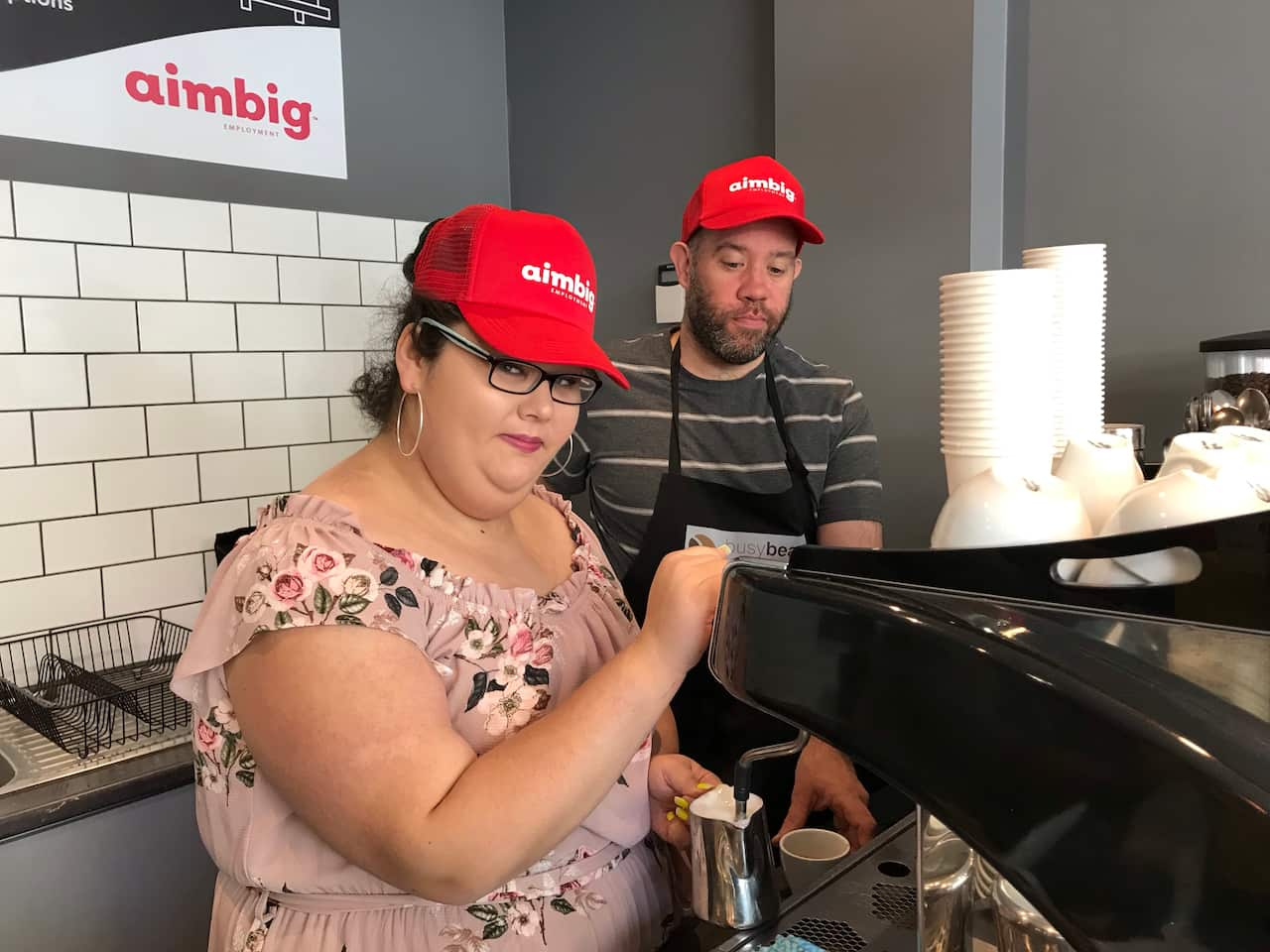Bianca Ward was bullied from the age of five because of her learning disability.
After struggling to find work, she went on to further education, and now 20, says things are on the up.
“I’ve been through TAFE and I haven’t been bullied since and it’s been really good,” she told SBS News.
She has recently been given an opportunity with the BusyBeans program, which trains those having difficulty finding employment how to make coffee, before matching them with companies looking to hire a barista.

Bianca Ward and Andrew Kenny are training to be baristas. Source: SBS
“I’ve been here for four months. Since I started it’s been really great,” she said.
“When I very first started I was anxious and nervous. Since then I’ve had the confidence, the support and people.”
Bianca is one of 14 participants who have a range of disabilities - including intellectual disabilities, autism and Down syndrome - who are being trained at the BusyBeans cafe in Moonee Ponds, in Melbourne's north-west.
It opened its doors to the public this week.

BusyBeans cafe where baristas train in Melbourne Source: SBS
The program was trialled in Sydney last year and has since expanded to Melbourne with plans for further sites in Gosford and on the Gold Coast.
It’s hoped it will help turnaround unemployment rates and discrimination against people with disabilities trying to find employment.
“Everyone really should have an equal right, equal opportunity to learn, work,” said Zoe Justin, the barista trainer at the Moonee Ponds cafe.
“The majority who come on board are nervous, scared, never been behind a coffee machine before and the transition is massive, really massive.”
Discrimination against young people with a disability
Only 52 per cent of the estimated 2.2 million people of working age who live with a disability in Australia are in the workforce.
But young people aged between 15 and 24 living with a disability have a 10 times higher chance of facing discrimination compared to those aged over 65.
Johnathan Kha has autism and has faced rejection when looking for work.
“I’ve tried to apply for other different jobs but I’ve got rejected and yeah makes me feel really sad not getting an actual job,” he said.

Patrick Grace, 21 and Johnathan Kha, 26 have been training to make coffee at BusyBeans cafe. Source: SBS
The 26-year-old is working at the BusyBeans cafe until he can find a job closer to his home.
“Especially with your disability and stuff, it makes it hard to get a job, it makes me feel stressed,” he said.
Andrew Kenny, 38, has struggled to maintain a full working week because of his intellectual disability.
He had to quit a previous job because of bullying.

Andrew Kenny hopes to travel overseas to continue making coffee in the future. Source: SBS
But being involved in the BusyBeans cafe program has given him a boost and he hopes to travel overseas to continue making coffee in the future.
“I’ve gained a lot more skills since coming here and compared to other jobs I’ve been in, this is my passion,” he said.
Disability rights group pushes for action
The national advocacy group People with Disability Australia says employers need to do better.
“We need to do more than mean well and we need programs that do well, for example, moving to a system where there are nationally consistent standards,” its chief executive Jeff Smith said.
“People with intellectual disability face barriers around discrimination, employer and community attitudes towards disability, recruitment practices, issues around physical accessibility.”
Mr Smith said disability employment services have mixed results because only one in 10 people go on to attain a permanent job.
“One of the issues with some of the disability employment services is they don't have a great track record across Australia,” he said.

Trainer Zoe Justin at the BusyBeans coffee shop Source: SBS
The employment provider behind BusyBeans, AimBig Disability Employment Services, said it wants to shake-up the market to help people with disabilities find meaningful employment.
“There is a perception that people with disability are not able to perform work," its chief executive Marcella Romero said.
"All really they need is the support ... a structured program where they are given the opportunity to succeed.”
“Most of the people placed in the program would not survive in a normal fast pace cafe environment, but through training, support and working to a person’s strengths we are really seeing our participants thrive.”
AimBig has so far trained 60 participants, and 11 companies - including Talent, Atlassian, Commonwealth Bank and LinkedIn - currently have one of their baristas or multiple baristas employed.
Bianca has been working at a fast-food restaurant alongside her barista training.
She says she has been enjoying the creation of latte art and the program has given her the skills and confidence to want to eventually open her own coffee shop.


